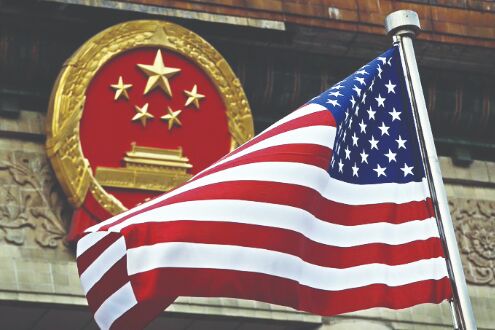US and China sparring over Taiwan heats up anew

Washington DC: The United States and China are stepping up their war of words over Taiwan in a long-simmering dispute that has significant implications for the power dynamic in the Indo-Pacific and beyond.
Amid a surge in Chinese military activity near the island that China regards as a renegade province and has vowed to reclaim by force if necessary, Washington and Beijing have launched new campaigns for global support for their respective positions, each using the stern and lofty language of sovereignty and international precedent. And neither is backing down.
While the disagreement over Taiwan isn't new and has long vexed relations between the countries, recent developments suggest the two are coming closer to confrontation. Last week, President Joe Biden set off alarm bells in Beijing by saying the U.S. has a firm commitment to help Taiwan defend itself in the event of a Chinese attack.
China protested and the Biden administration sought to play down the comments. White House, State Department and Pentagon officials all said the president did not mean to imply any changes in the U.S. one-China policy, which recognizes Beijing but allows informal relations and defense ties with Taipei.
The officials took pains to say that America's commitment to Taiwan remains steadfast but continues to be guided by a policy of strategic ambiguity over military-related specifics that falls short of a treaty-enshrined mutual defense pact. Since then, however, the administration has upped the ante on the diplomatic front.
Secretary of State Antony Blinken on Tuesday publicly urged other members of the United Nations to reject China's assertion of absolute sovereignty over Taiwan and join the U.S. in supporting Taipei's independent participation in international organizations related to transportation, health, climate change, culture and education.
As the international community faces an unprecedented number of complex and global issues, it is critical for all stakeholders to help address these problems, Blinken said in a statement. This includes the 24 million people who live in Taiwan. Taiwan's meaningful participation in the UN system is not a political issue, but a pragmatic one.
He noted that Taiwan has been prevented from participating in meetings of the International Civil Aviation Organization despite being a major transit hub and the World Health Organization despite having fielded an effective response to the COVID-19 pandemic.
Taiwan's exclusion undermines the important work of the UN and its related bodies, all of which stand to benefit greatly from its contributions, Blinken said.
That is why we encourage all UN Member States to join us in supporting Taiwan's robust, meaningful participation throughout the UN system and in the international
community.



